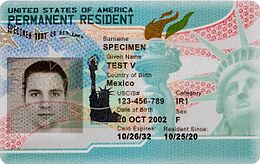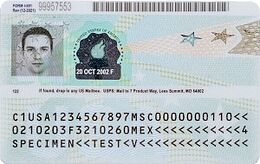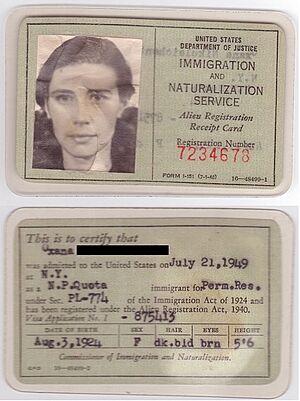Green card facts for kids
Quick facts for kids United States Permanent Resident ID Card |
|
|---|---|
 |
|

Sample of a Permanent Resident Card (often called a "green card") of the United States (2023)
|
|
| Type | Personal identification document |
| Issued by | |
| Purpose | Identification |
| Expiration | 10 years (standard) 2 years (conditional) |
A green card, known officially as a permanent resident card, is an identity document which shows that a person has permanent residency in the United States. Green card holders are formally known as lawful permanent residents (LPRs). As of 2023[update], there are an estimated 12.7 million green card holders, of whom 9 million are eligible to become United States citizens. Approximately 18,700 of them serve in the U.S. Armed Forces.
Green card holders are statutorily entitled to apply for U.S. citizenship after showing by a preponderance of the evidence that they, among other things, have continuously resided in the United States for one to five years and are persons of good moral character. Those who are younger than 18 years old automatically derive U.S. citizenship if they have at least one U.S. citizen parent.
The card is known as a "green card" because of its historical greenish color. It was formerly called a "certificate of alien registration" or an "alien registration receipt card". Absent exceptional circumstances, immigrants who are 18 years of age or older could spend up to 30 days in jail for not carrying their green cards.
Green card applications are decided by the United States Citizenship and Immigration Services (USCIS), but in some cases an immigration judge or a member of the Board of Immigration Appeals (BIA), acting on behalf of the U.S. Attorney General, may grant permanent residency in the course of removal proceedings. Any authorized federal judge may do the same by signing and issuing an injunction. Immigrant workers who would like to obtain a green card can apply using form I-140.
An LPR could become "removable" from the United States after suffering a criminal conviction, especially if it involved a particularly serious crime or an aggravated felony "for which the term of imprisonment was completed within the previous 15 years."
Contents
History

The Immigration and Naturalization Service was formed as part of the Department of Labor in 1933, and in 1940 was moved under the Department of Justice along with the Nationality Act of 1940. During the 1940s the predecessor to the "Permanent Resident" card was the "Alien Registration Receipt Card" which on the back would indicate "Perm.Res" in accordance with the Immigration Act of 1924.
The INA, which was enacted by the U.S. Congress in 1952, states that "[t]he term 'alien' means any person, not a citizen or national of the United States."
Green card lottery
Each year, around 55,000 immigrant visas are made available through the Diversity Visa (DV) program, also known as the Green Card Lottery to people who were born in countries with low rates of immigration to the United States (fewer than 50,000 immigrants in the past five years). Applicants can only qualify by country of chargeability, not by citizenship. Anyone who is selected under this lottery will be given the opportunity to apply for permanent residence. They can also file for their spouse and any unmarried children under the age of 21.
If permanent residence is granted, the winner (and their family, if applicable) receives an immigrant visa in their passport(s) that has to be "activated" within six months of issuance at any port of entry to the United States. If already in the U.S. adjustment of status may be pursued. The new immigrant receives a stamp on the visa as proof of lawful admittance to the United States, and the individual is now authorized to live and work permanently in the United States. Finally, the actual "green card" typically arrives by mail within a few months.
Green card lottery scams
There is a growing number of fraudulent green card lottery scams, in which false agents take money from applicants by promising to submit application forms for them. Most agents are not working for the distribution service. Some claim that they can increase the chance of winning the lottery, when in fact, they may delay or not submit the application. Likewise, some claim to provide to winners free airline tickets or other benefits, such as submissions in future years or cash funds. There is no way to guarantee their claims, and there are numerous nefarious reasons for them not to fulfill their promises. Applicants are advised to use only official U.S. government websites, in which the URL ends in .gov.
Green card lottery e-mail fraud
Other fraud perpetrators will e-mail potential victims posing as State Department or other government officials with requests to wire or transfer money online as part of a "processing fee". These fraudulent e-mails are designed to steal money from unsuspecting victims. The senders often use illegitimate e-mail addresses and logos designed to make them look more like official government correspondence. One easy way to tell that an email address is fraudulent is that it does not end with ".gov". One particularly common fraud email asks potential victims to wire money via Western Union to an individual (the name varies) at the following address in the United Kingdom: 24 Grosvenor Square, London. These emails come from a variety of email addresses designed to impersonate the U.S. State Department. The USCIS blog has published information on this email scam and how to report fraudulent emails to the authorities. The U.S. government has issued warnings about this type of fraud or similar business practices.
See also
 In Spanish: Green Card para niños
In Spanish: Green Card para niños

